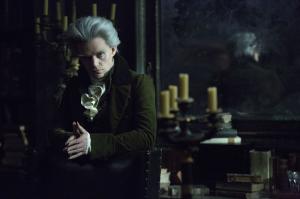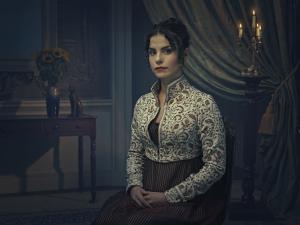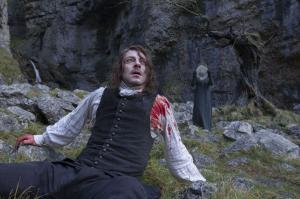Jonathan Strange & Mr Norrell Episode Seven - Jonathan Strange & Mr Norrell
Monday, 29 June 2015 - Reviewed by
All good things must come to an end, and the finale of Jonathan Strange & Mr Norrell is the most spectacular episode yet. So much happens, with so much nuance crammed in, and so much startling imagery. The ensemble cast, all so good in previous instalments all crank it up a notch here. This is a satisfying end to a big story.
It opens ominously. The mirrors of England have all been smashed by Strange's trick with the ravens, Magic is in disgrace, its reputation in ruins, shouted down by the whole of government. Strange is still in his black tower, Norrell has taken his leave back to Yorkshire, and the Gentleman is still continuing his lengthy, cruel dance.
In fact, reputation turns out to be a major theme, it's hinted at in previous episodes, but really comes to the fore here. The disgraced Drawlight, his clothes in tatters, meets with Lascelles - who really has turned out to be a nasty piece of work. Drawlight has been reduced to a tragic figure, determined to deliver Strange's messages (and Lady Pole's missing digit). Lascelles refuses to let him near Norrell, and kills his former associate to preserve Norrell's reputation, and therefore his own.
Lascelles then visits Norrell, where Childermass quickly cuts through the bluster to the truth. Lascelles pulls a knife on Childermass and cuts his face (Norrell is too busy attempting to erect a magical barricade to notice), but Childermass takes the opportunity to steal back what Lascelles has taken. The two men neatly spell out that this version of England truly has its own North-South divide, Lascelles sees himself as a 'gentleman', and Childermass as 'from the gutters of Yorkshire'. Childermass, a man who's had a belly full over the last six episodes, calmly reminds Lascelles that he is in the North, where the Raven King lives on in hearts and minds, witheringly resigns from Norrell's service, and leaves like a boss.
This leads straight to the confrontation between the increasingly raddled Strange and scared Norrell, as Jonathan appears in Norrell's library. The two have shared little screen time over the last couple of episodes, but they finally lock horns here. It all ends with bathos, as Norrell has little recourse to Jonathan's onslaught but to make it rain.
But the dying Strange doesn't want to kill Norrell, he wants his help. Norrell is still in denial about his bargain with the Gentleman, but ruefully says that didn't want Strange to fall into his mistake. When Strange decides to attempt to summon the Raven King, he and Norrell finally truly work together. Norrell even manages a compliment about Strange's book - "The most beautiful book of magic I have ever read". The relationship between the two men is complex, but teased out beautifully by Bertie Carvel and the more understated Eddie Marsan, whose quiet, nuanced performance is never better here.
This leads to the showstopping arrival of John Uskglass, the Raven King - who sweeps in spectacular fashion, finding the hanged Vinculus, reviving him from the dead, and rewriting the book Vinculus has tattooed on his person. He may look like the singer from a Black Metal band and say nothing whatsoever, but this guy has serious presence. It's a shame he has so little screen time, but there is a lot to cover here.
Back at Chez Segundus, things finally come to a head, as a freshly resigned Sir Walter Pole learns Stephen serves the Gentleman.
Well-meaning Segundus finally reunites Lady Pole with her finger and her sanity, pulling her out of the Gentleman's dance, and incurring the Faerie Host's fury. Lady Pole finally gets to give the Gentleman both barrels, she is quite done with being bartered by 'gentlemen'. The malevolent Faerie manages a classic quip of "Why are you firing Walnuts at me?" before we see him at his cruellest, taking a different sense away from both the Poles, Segundus, and Honeyfoot in a scene of magical body horror.
Strange and Norrell's efforts to put all of English Magic into the Raven King backfire (much to Norrell's chagrin, as his entire library goes in the process, (in a nice touch, Norrell's wig is blown off) and, as a result of a misunderstanding of naming convention, all of the power goes into Stephen - who is promptly shot dead by Lascelles. Lascelles gets his comeuppance at the hands of the furious Gentleman, who turns him to shattering glass before taking Stephen's body back to Lost Hope, where he is revived.
The magicians pursue them to Lost Hope, where Stephen, the 'nameless slave' finally rebels against his bonds of slavery and kills the Gentleman in a huge, powerful set piece, that destroys the Faerie King's domain, freeing Arabella, and flinging her through a mirror into the care of the Greysteels in Venice.
Norrell and Strange have been both master and pupil and bitter enemies up to now. It's a joy to see their excitable chemistry at work as they finally become a team of equals. It's a little too late though. Strange is still somehow trapped in the 'Black Tower', and Norrell, a man not known for his valour or moral character, is trapped with him. They enter a sort of limbo together as friends, as the Raven King restores order, unseen, observed by Childermass and Vinculus.
An elegaic scene follows in Venice between Arabella, and Strange's reflection in a well. Jonathan, looking sane and healthy, speaks to Arabella from whatever realm he is in, reaffirming his love for her - but telling her not to wait for him and become a widow. It's emotional stuff, delivered well by Carvel and Charlotte Riley. Strange's love for his wife has powered the series, and his appearance to say goodbye is touching.
The last word is left to Childermass, in a scene echoing the first scene of episode one, revisiting the same gathering of would-be magicians to symbolically hand over the torch, bringing in Vinculus as the set text to study.
This series has been one of the BBC's best efforts in some years. It never captured the public's imagination to any great degree ratings-wise, but as a prestigious production it may prove a watershed, the BBC doesn't traditionally go to town on anything that won't get a lot of commercial return back. At seven episodes and with no follow-up book to base a potential second series on, it stands alone - wonderfully adapted by Peter Harness and Toby Haynes. The cast is great, Carvel and Marsan are excellent leading men, but the show is often stolen by Enzo Cilenti's brooding, charismatic Childermass, and Marc Warren's malevolent Gentleman. It looks fantastic, and I'm running out of superlatives. I'll just sign off with this - it's been magic.
It opens ominously. The mirrors of England have all been smashed by Strange's trick with the ravens, Magic is in disgrace, its reputation in ruins, shouted down by the whole of government. Strange is still in his black tower, Norrell has taken his leave back to Yorkshire, and the Gentleman is still continuing his lengthy, cruel dance.
In fact, reputation turns out to be a major theme, it's hinted at in previous episodes, but really comes to the fore here. The disgraced Drawlight, his clothes in tatters, meets with Lascelles - who really has turned out to be a nasty piece of work. Drawlight has been reduced to a tragic figure, determined to deliver Strange's messages (and Lady Pole's missing digit). Lascelles refuses to let him near Norrell, and kills his former associate to preserve Norrell's reputation, and therefore his own.
Lascelles then visits Norrell, where Childermass quickly cuts through the bluster to the truth. Lascelles pulls a knife on Childermass and cuts his face (Norrell is too busy attempting to erect a magical barricade to notice), but Childermass takes the opportunity to steal back what Lascelles has taken. The two men neatly spell out that this version of England truly has its own North-South divide, Lascelles sees himself as a 'gentleman', and Childermass as 'from the gutters of Yorkshire'. Childermass, a man who's had a belly full over the last six episodes, calmly reminds Lascelles that he is in the North, where the Raven King lives on in hearts and minds, witheringly resigns from Norrell's service, and leaves like a boss.
This leads straight to the confrontation between the increasingly raddled Strange and scared Norrell, as Jonathan appears in Norrell's library. The two have shared little screen time over the last couple of episodes, but they finally lock horns here. It all ends with bathos, as Norrell has little recourse to Jonathan's onslaught but to make it rain.
But the dying Strange doesn't want to kill Norrell, he wants his help. Norrell is still in denial about his bargain with the Gentleman, but ruefully says that didn't want Strange to fall into his mistake. When Strange decides to attempt to summon the Raven King, he and Norrell finally truly work together. Norrell even manages a compliment about Strange's book - "The most beautiful book of magic I have ever read". The relationship between the two men is complex, but teased out beautifully by Bertie Carvel and the more understated Eddie Marsan, whose quiet, nuanced performance is never better here.
This leads to the showstopping arrival of John Uskglass, the Raven King - who sweeps in spectacular fashion, finding the hanged Vinculus, reviving him from the dead, and rewriting the book Vinculus has tattooed on his person. He may look like the singer from a Black Metal band and say nothing whatsoever, but this guy has serious presence. It's a shame he has so little screen time, but there is a lot to cover here.
Back at Chez Segundus, things finally come to a head, as a freshly resigned Sir Walter Pole learns Stephen serves the Gentleman.
Well-meaning Segundus finally reunites Lady Pole with her finger and her sanity, pulling her out of the Gentleman's dance, and incurring the Faerie Host's fury. Lady Pole finally gets to give the Gentleman both barrels, she is quite done with being bartered by 'gentlemen'. The malevolent Faerie manages a classic quip of "Why are you firing Walnuts at me?" before we see him at his cruellest, taking a different sense away from both the Poles, Segundus, and Honeyfoot in a scene of magical body horror.
Strange and Norrell's efforts to put all of English Magic into the Raven King backfire (much to Norrell's chagrin, as his entire library goes in the process, (in a nice touch, Norrell's wig is blown off) and, as a result of a misunderstanding of naming convention, all of the power goes into Stephen - who is promptly shot dead by Lascelles. Lascelles gets his comeuppance at the hands of the furious Gentleman, who turns him to shattering glass before taking Stephen's body back to Lost Hope, where he is revived.
The magicians pursue them to Lost Hope, where Stephen, the 'nameless slave' finally rebels against his bonds of slavery and kills the Gentleman in a huge, powerful set piece, that destroys the Faerie King's domain, freeing Arabella, and flinging her through a mirror into the care of the Greysteels in Venice.
Norrell and Strange have been both master and pupil and bitter enemies up to now. It's a joy to see their excitable chemistry at work as they finally become a team of equals. It's a little too late though. Strange is still somehow trapped in the 'Black Tower', and Norrell, a man not known for his valour or moral character, is trapped with him. They enter a sort of limbo together as friends, as the Raven King restores order, unseen, observed by Childermass and Vinculus.
An elegaic scene follows in Venice between Arabella, and Strange's reflection in a well. Jonathan, looking sane and healthy, speaks to Arabella from whatever realm he is in, reaffirming his love for her - but telling her not to wait for him and become a widow. It's emotional stuff, delivered well by Carvel and Charlotte Riley. Strange's love for his wife has powered the series, and his appearance to say goodbye is touching.
The last word is left to Childermass, in a scene echoing the first scene of episode one, revisiting the same gathering of would-be magicians to symbolically hand over the torch, bringing in Vinculus as the set text to study.
This series has been one of the BBC's best efforts in some years. It never captured the public's imagination to any great degree ratings-wise, but as a prestigious production it may prove a watershed, the BBC doesn't traditionally go to town on anything that won't get a lot of commercial return back. At seven episodes and with no follow-up book to base a potential second series on, it stands alone - wonderfully adapted by Peter Harness and Toby Haynes. The cast is great, Carvel and Marsan are excellent leading men, but the show is often stolen by Enzo Cilenti's brooding, charismatic Childermass, and Marc Warren's malevolent Gentleman. It looks fantastic, and I'm running out of superlatives. I'll just sign off with this - it's been magic.



 5- Kill the Boy, 6 - Unbowed, Unbent, Unbroken
5- Kill the Boy, 6 - Unbowed, Unbent, Unbroken 






